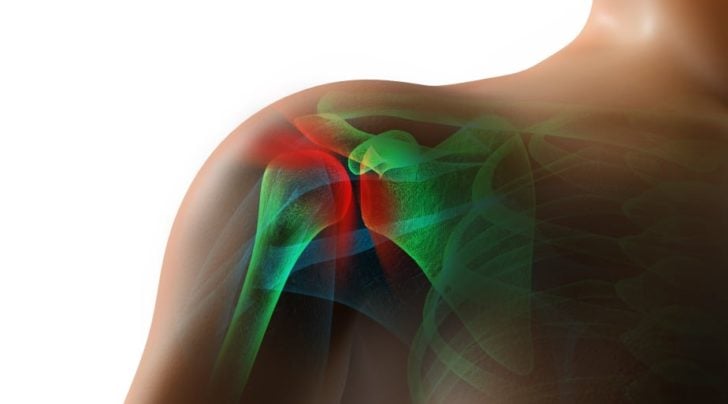
Rotator cuff tears are one of the most common reasons why people have shoulder pain. But there are many people who have rotator cuff tears and have no pain. Many rotator cuff tears can be treated without surgery and result in a painless, well functioning shoulder. Some of you may have persistent pain despite medications, injections and physical therapy. Therefore, some of you may wish to consider rotator cuff surgery. This post will help address many of the key questions you should have about rotator cuff tears and whether or not you should think about having shoulder surgery. More than ever it is important that you have a good understanding about rotator cuff tears.
The rotator cuff is made up of 4 muscles which control how well your shoulder works. If a tear in the rotator cuff is large enough it can affect how well the shoulder will function. Most rotator cuff tears are actually due to degeneration of your tendons. Some tears may occur because you were injured… such as a fall, or sports injury.
Let’s review…
5 Facts You Must Know About Rotator Cuff Tears:
- The most common cause of a rotator cuff tear is degeneration. That means your tissue simply wore out over time. These tears can become larger with time, but that is not always the case. Many degenerative tears are very small. Many patients with degenerative tears can avoid surgery. Take home message: Inquire about your type of tear. If you have a small degenerative tear, a discussion about surgery should only occur after you have failed a proper non-surgical treatment regimen. Recent advances have enabled us to repair rotator cuff degeneration and degenerative rotator cuff tears with a biological patch.
- Trauma or injuries can cause rotator cuff tears. If you have fallen on your side, and now you find that you can not move your arm due to pain and weakness, you have likely suffered a large traumatic tear of the rotator cuff. Traumatic tears are treated differently then degenerative tears. In this case, you had a normal tendon which tore because of a traumatic event. These injuries are typically treated with surgery to repair the rotator cuff. Take home message. If you fell and now have significant weakness… do not wait too long before seeing an Orthopedist. If your tear is large, it will retract and turn to fat. It is better to treat these sooner rather than later.
Retraction and Atrophy. Muscles in our body are under tension. Like a rubber band stretched between two fingers. If a tendon is torn on one end, it will start to retract or pullback towards the other end. If you have a large tear, then your rotator cuff tear can retract significantly. If it has retracted more than 3 centimeters the repair might be difficult to perform and your result might suffer, or degrade with time. When a muscle is not functioning well, it will turn to fat. Our body is cruel! If you have had a tear for a while, then there is a chance that the muscle has turned to fat.. and is NOT capable of working like a muscle. Unfortunately, once a muscle has turned to fat, it can not turn back into muscle. Take home messages: Talk to your doctor. Is your tear retracted? How far? Ask how that will affect your ultimate result. Do you have fat replacement of the muscle? How much? If it is significant, you may not be happy with the result of an attempted repair.
- Just because something is torn, does not mean it needs to be fixed. I see far too many second opinions where people had an MRI, were diagnosed with a small tear and told that they need surgery. The reason given for the need for surgery was simply because something was torn. That’s simply not true. Many people are living with tears of their rotator cuff and do not even know they have one. Just because something is torn does not mean it needs to be fixed. Take home message. If you have not had trauma or a serious injury and you are diagnosed with a small tear and have not been offered non-surgical treatment options it’s time to see a second opinion.
- Be treated like a person… not an MRI finding. All people are not created equal. All tears are not created equal. When determining what the proper treatment option is for you, your surgeon must take into account the type of tear you have, your story, your goals, your current quality of life and whether or not those goals are achievable given your exam, and your MRI findings. Take home message: Not all tears require surgery. Not all tears can be repaired. What are your goals? They matter! Are they achievable — with or without surgery? Don’t be afraid to ask questions.
Rotator cuff tears : Because you likely have more questions… see these articles for more information.
Click here to read more on the causes of rotator cuff tears.
Click here to read more about the function Rotator Cuff.
Why didn’t my rotator cuff heal?
Do you have questions regarding an Orthopedic injury or longevity?
Do you want to talk to an expert who can listen to you for 45-60 minutes and explain the options in detail?
Dr. Howard Luks offers remote guidance sessions to review your X-ray or MRI images and explain your options.
Dr. Luks has also received hundreds of requests for educational sessions on the topics discussed in his book, Longevity Simplified.
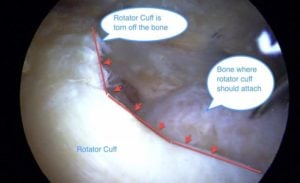

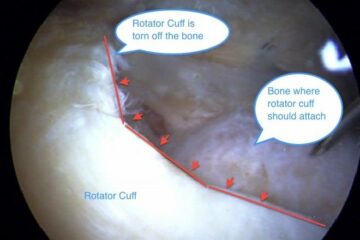
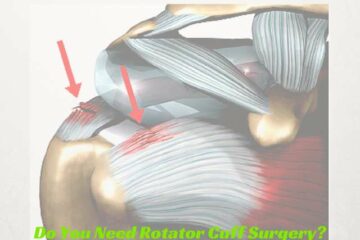
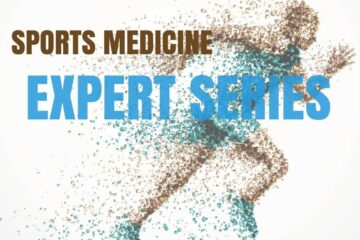
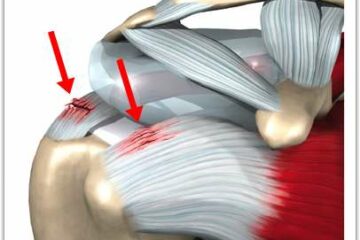








Diane
Good read thank you :)
In December I was running with my 100 lb dog and best friend. I tripped he kept moving so I landed on my shoulder hyper-extended broke my right shoulder blade and am awaiting surgery in March for a bad tear.
Told not to do anything with it I have not listened because of fear of it getting fat. It hurts worse all of the time. Will I cause it to retract by using it more than I should? What causes retraction?
retraction occurs over time … even if you try not to use it. It’s an unfortunate consequence of rotator cuff injuries. Not all tears will retract. Usually large tears with two or more muscles will retract.
Michelle
Thank you
So grateful for the excellent information.
I worked as a nursing assistant for 12 years lifting patients, in the past 2 years I felt a soreness & sometimes a little pain in my right shoulder/arm. I thought it was a sore muscle and then it would get better. 2 weeks ago I went bowling & my shoulder , top of my right arm was hurting, that night I was in excruciating pain. Called my doctor & he sent me to have an ultra sound & physical therapy script. The following day I was in awful pain and they got an MRI approved . It should a full thickness tear .
I can not use my arm and I am right handed and the pain is so bad. After everything I read , is it tru that a full thickness tear can not heal on its own? I am a holistic nutritionist and I really do not like the idea of surgery but I can not live like this! I was surprised when I visited an orthopedic surgeon today , that he gave me a cortisone shot. I ask is there anything I can be doing & what’s next surgery? & he said oh no, we would not do surgery before 3 months?
I can’t live like this for 3 months, the shot did not work, I am in pain & have very little use of my right arm. I feel like I’m being made to jump through hoops to go through a process for non-surgical treatment regimen , to satisfy health insurance, when I feel the only option at this point is surgery.
Any thoughts, comments, advice?
Terri
never thought in a million years i would be writing to an internet doctor! But here goes: I hurt my right shoulder 2.5 years ago after yanking hard on a stuck wetsuit zipper and then swimming a couple of miles. Excruciating pain the next day. PT then my first orthopedic surgeon. He did an MRI which showed nothing alarming, but recommended surgery to “fix everything that was wrong” and hope for the best. Said i would be recovering for a very long time and that it might not solve anything. I declined. More PT cortisone a second opinion. Second guy said nothing wrong with shoulder diagnosed myofascial pain syndrome and sent me to physiatry. More injections, acupuncture, massage etc. no change. Next sports medicine and more pt, then another surgeon who eventually said scapular issues and sent me to well known surgeon to see about scapular surgery. He said no problem with either the shoulder or scapular. Then to a neck and spine guy who said no problem with neck.Then I was sent to yet another shoulder doctor who did do another MRI (my third on the shoulder and one on the scapula) Anyway the latest MRI shows a SLAP tear from 12-7, partial tear of supraspinatus 1.5cm without atrophy and a small tear in infraspinatus and well as other little things. Surgeon says he doesn’t operate of these things at my age-61. Says tendons have frayed and everyone has a Slapper and they don’t hurt. SO what next? I am in constant pain and although I still have a full rom. Cortisone has not helped. I have tried everything. Spent thousands on alternative treatments and to make things worse my left shoulder hurts from the PT. The doctor who sent me to the others for scapula surgery says he can fix the left one, but not until the right one is fixed.HELP! I need at least one arm.
I’m glad you rolled the dice :- )
So .. partial rotator cuff tears, almost always due to rotator cuff tendinosis CAN be a painful condition. Just because something shows up on an MRI does not mean that it is the cause of pain though. That is my problem and why I can not offer specific advice. Unless I examine someone I do not know what is bothering you. Many shoulder physicians, myself included, utilize Ultrasound guided injections of the various spaces around the shoulder. If we inject a numbing medicine and the pain goes away then we know that that particular area in the likely cause of your pain. In your case, having a radiologist perform an ultrasound guided subacromial injection (the space above the rotator cuff) might be a worthwhile test. If the injection works then you know the source of your pain.
I agree with the “Slapper” doctor… FAR TOO MANY SLAP lesions are being fixed. Most people at 60+ have them and they do not cause symptoms in our age group
Ted Hwang
You provide the most useful information on the internet regarding rotator cuff injuries. I’m a 28 year old male who tore his supraspinatus tendon 16 months ago (partial tear) 6 weeks of PT and it healed well. Most recently I tore the tendon again after getting another MRI… and it seems the tear is slightly bigger but still a partial tear. Do you recommend getting PT again to see if it heals it or do you believe that since it is reoccurring for its second time that I should get surgery? Do you hear about tears happening again and do they usually heal again?
Tough to recommend surgery for a partial tear unless you fail to respond to non-surgical measures and have significant pain. Tears can become larger … but they typically do not become larger quickly at all. No rush for now.
Thanks for the kind comments !!
james mcdonnell
Right, so you’re a proper doctor, and yet to mentioned muscle turning to fat!!
Muscle tissue absolutely cannot turn to fat, it is a total physical impossibility. Muscles atrophy or the grow, they do not change from one form to another.
An individual may lose muscle mass, and increase the amount of body fat, but there is no mechanism by which muscle can turn into fat, they are entirely different things.
You are correct… we do not understand fatty infiltration. But we need to try and make it easier to comprehend for the masses.
Molecular mechanisms
The molecular mechanisms that lead to the development of rotator cuff muscle atrophy and FI have not been well-defined. Two key components in the development of these muscle changes appear to be unloading of the muscle-tendon unit and denervation of the muscle.
Akt-mTOR and muscle atrophy
The Akt-mTOR (mammalian target of rapamycin) pathway plays a central role in the signal transduction pathway that regulates muscle size. mTOR serves as a downstream effector in the IGF (insulin-like growth factor) pathway, insulin pathway, and mechanical pathways and regulates muscle protein synthesis. It is also involved in protein degradation by interfering with major muscle protein degradation pathways, including the autophagy and ubiquitin-proteasome pathway.
Recent studies of massive RCTs in a small animal model are investigating the role of the Akt-mTOR pathway in the development of muscle atrophy and FI. Data from these studies suggest that tendon transection and denervation affect the regulation of the Akt/mTOR pathway in fundamentally different ways.
After an isolated tendon injury, a small increase in muscle atrophy was seen, with downregulation of the Akt/mTOR pathway. Conversely, after denervation, muscle atrophy is significant, and Akt/mTOR activity, expression of atrophy-related genes (MuRF1 and MAFBx), and protein degradation increase. Thus, the Akt/mTOR pathway appears to have a central role in the development of muscle atrophy.
FI, Akt/mTOR, and PPARγ
Previous studies had suggested that the presence of adipocytes in atrophied rotator cuff muscles is due to the differentiation of pre-adipocytes into adipocytes. This process is mediated by the PPARγ (peroxisome proliferator activated receptor gamma) transcription factor.
PPARγ is the dominant regulator of adipogenesis and has been proven to be both necessary and sufficient for fat cell differentiation. A recent study on RCTs using a sheep model found that PPARγ expression increased following transection of the rotator cuff with significant FI development.
Interestingly, a small animal rotator cuff model has shown that PPARγ can be regulated by the Akt/mTOR pathway. An in vitro study has demonstrated that adipogenic differentiation induced by PPARγ up-regulation was under the control of transcription factor sterol regulatory element binding protein 1 (SREBP-1). The Akt/mTOR signaling pathway has been shown to regulate SREBP-1 activation, suggesting SREBP-1 is a link between Akt/mTOR activation and FI.
A recent small animal study evaluated the expression of Akt/mTOR, SREBP-1, and PPARγ in a rotator cuff model with a combined tendon and nerve injury. Increased mTOR activity and increased SREBP-1 and PPARγ expression was seen. However, the most important aspect of this study was that inhibiting mTOR with rapamycin not only led to decreased mTOR activity and decreased SREBP-1 and PPARγ expression, but also to the elimination of FI. Thus, the identification of these pathways has led to potential targets for pharmacologic inhibition of FI.
john
I have a full tear on my subscap. ..my pain is manageable and it requires surgery. .i am able to work my very physical job..If I decide against surgery what are my longterm effects?
ARE THEY SURE THE ENTIRE SUBSCAPULARIS IS TORN. THAT IS UNLIKELY IF THE ARM IS THAT FUNCTIONAL
Valerie
I play tennis 3-4 times a week and noticed right shoulder discomfort at night while trying to sleep. I am left-handed. When to ortho Dr. and has MRI and was told my tendon was ruptured and retracted. I still have total mobility and the Dr. was amazed there is no pain just weakness, but insist surgery is needed to pull tendon back and anchor it down. Is surgery required and there is no pain, but complete mobility? I may not get the mobility back? And if I wait to long might need reversible shoulder replacement? Your opinion please
really tough situation. Some tears do become larger, some do not. The question you need to ask your doc is what does the literature say about the success rate of surgery for a retracted tear? Depending on how much retraction and if the muscle has fatty atrophy, then the results can be rather poor.
Time to do some more research and then go back with many questions.
greg Basso
Will accupuncture help relieve the pain?
perhaps… little harm in trying
Fiona Seamer
Dears Dr,
I fell in my kitchen 4th May & dislocated my shoulder. I had an MRI for Mother’s Day revealing I had bruised(fractured) my humerus head, HAGL off the bone and suprasprinatus rotator cuff. Pain from the fracture has now gone and physio I have an anterior lift of 140 degrees and oblique lift of 80 degrees. Still pain and weakness with the RC & my Orthopedic surgeon is recommending surgery. I’m 48 and want to be able to swim overran again and have no pain. Can I achieve this without surgery or not? How long do I have to make my decision for my muscle to turn to fat?
it depends on many variables… Unfortunately I can’t say without seeing you and your scans.
Geoffrey Cope
Dear Sir
I have just had an ultrasound the results are a small Tare the pain i get is mostly down the arm into the elbow is this common. I can move the arm up down and around with out pain and have no problem sleeping. I’m going to see orphopedic doctor next week to see what can be done. I don’t want surgery my age is 68 and was up to this happening a lawn green bowler ie out doors. When I was at work 8 years ago my job was lifting most of the day and have no problem with my arm. I must point out 3 years ago I feel of a ladder smashed this arm on to a concret post had pain for a few weeks nothing since.
best regards Geoff
Physical therapy sounds like a great option … we typically do not chase small tears. Most can be safely watched.
shawna
hello. great article. thank you for all the good info. for me, it is too late. i had probably long time with degenerative tearing, then one push of a piece of furniture and i hear the ripping sound. sadly, i did see several doctors, and they all recommended surgery but with just a five minute or less visit, nothing really EVER explaining what would happen if i didnt, only that i would be back when i couldnt stand the pain, but they allllll gave me cortisone injections…so i never did get to the level of pain, just finally a got a doc that cared enuf to take new mrs 2 years after and then tell me in detail, what was really going on. i am 53, working waitress, healthy non smoker, non drinker…active mother of 5 with two fully torn and retracted shoulder rc. left, massive tear supra, large tear infra, large tear bicep and out of medial groove. r, large tear supra, sml tear infra. and a few other things. doc says i have only a 50 % chance of successful surgery and if i were older he would recommend a total replacement. IS THIS IT?? THIS IS ALL THERE IS?? NO OTHER OPTION???? it feels incredible to me!!!!! yes, my shoulder hurt like a son of a gun, and yes, i have very limited rom, which ive grown accustomed to over the past 2 years…*T-Rex”!! and no, i cannot live lie this without injections to kill the major part of the pain….so that’s it??? i have to risk being worse? or not working at all? i just seems so crazy…and why are there soooooooooooo many??? it’s like Asian manicurists….one on every corner! what is going on? HELP…i dont want this surgery!!!!!! but how can i live like this for another ???? years??? nite time is so bad that if a surgeon walked into my room in the middle of the nite, I would let him cut me…but….in the day, i cope. i am scared to death of this surgery!!!!! what did they do before all these surgeries???
Jay Garbarino
I had a fall 10 weeks ago. I will be getting an MRI once approved. I am curious about what the time frameis for a large tear retracting and turning to fat.
You should be ok.
Paula Ernst
Thank you so much for this informative site and for addressing more than just the disease but quality of life etc. I have been diagnosed thru MRI with a large totator cuff tear…I saw an orthopedic surgeon who recommended surgery sooner rather than later (this after I had PT for about 4 months with some benefit but not significantly better). I got a second opinion from a physiatrist (sp?) at a Pain and Spine center that specializes in PRP and stem cell therapies….he was not also a surgeon but recommended we start with a non-steroidal anti-inflammatory injection. My range of motion was still quite good according to him (I can raise my arm up almost straight beside my head) even tho the MRI showed a significant tear…..he said he liked to treat functionality rather than just an MRI…. I’m going to get the injection as it seems pretty non-invasive and he said that could be all I need with continued PT. I am very hopeful…but would have felt better if he were also a surgeon. Your thoughts….and should I get yet another opinion from a surgeon… Thank you so much for your time and expertise. Paula